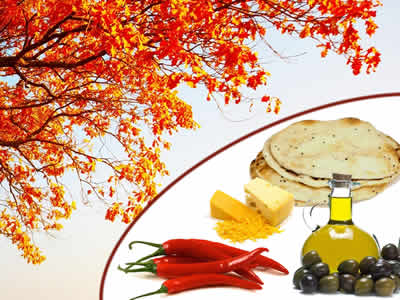According to Ayurveda, Autumn is vata season. Vata is “wind” dosha. If we think about the nature of wind, we can easily understand the qualities of vata: wind is light, irregular, rough, moving, quick and changeable. Also it is cool and dry because it blows heat and moisture away from the surface of the ocean, land and our body.
When our body becomes less moisturized, we will feel dryness, and may have the symptoms such as dry skin, dry hair, dry cough, dry intestines (constipation), itchy skin or throat, restless, nerves, sleepless, losing weight, etc.
In vata season – autumn, to balance our doshas, Ayurveda recommends to take a diet that has the properties to decrease vata. Vata season is light, dry and cold. So we should consume heavy, oily and hot foods to balance it:
| Season | Foods |
| Light | Heavy |
| Dry | Oily |
| Cold | Hot |
What are heavy foods, oily foods and hot foods? According to Ayurveda:
– Heavy foods include: bread, pasta, cheese, and yogurt
– Oily foods include: dairy products, meat, fatty foods, and cooking oils
– Hot foods includes: hot beverages and warm, cooked foods
Ayurveda suggests that in autumn, we should eat less light, dry and cold foods:
– Light foods include: millet, buckwheat, rye, barley, corn, spinach, lettuce, and apple.
– Dry foods include: bean, potato, barley, and corn.
– Cold foods include: cold beverages and raw foods.
One may ask a question: “Can’t we eat corn, lettuce, apple, and potato in autumn?”
Well, we still can eat these foods. But we should understand that these foods have light, dry or cold qualities that increase vata and decrease pitta or kapha. If your dosha is pitta or kapha, there will be no any problem to consume them.
“Then what about the people who live in poor areas and only have these foods to eat?”
Well, if you have no other choices or you want to eat these foods, Ayurveda suggests to add heavy, oily or hot foods to balance them. For example, you can add cheese, yogurt, meat, cooking oils to these foods. Cheese and yogurt are heavy; meat and cooking oils are oily. And you also should eat them in warm.
In Ayurveda, foods have six tastes: bitter, pungent, astringent, salty, sour and sweet.
The three tastes increase vata: bitter, pungent and astringent. And the other three tastes decrease vata: salty, sour and sweet. Ayurveda suggests to consume more salty, sour and sweet foods and eat less bitter, pungent and astringent foods in vata season – autumn.
There is an issue about pungent taste. Should we eat it or not in vata season? Pungent foods increase vata, but pungent foods are usually hot and spicy, should we consider them as hot foods, which decrease vata?
Let me explain it. Why we say pungent foods increase vata? Because pungent foods warm the body, and expel moisture. So pungent foods usually have drying properties. From this point, we can say pungent foods increase one quality of vata – dryness. But pungent foods warm the body, expel coldness. So pungent foods usually have warming properties. From this point, we can say pungent foods decrease one quality of vata – coldness.
Considering these, we can see that pungent foods have double-qualities: hot and dry. They affect two qualities of vata: increase dryness and decrease coldness. When we use hot spicies to warm our body and expel coldness, to avoid their drying properties, we should add heavy and oily foods to balance them, or add sweet taste foods to balance them.
People with vata imbalance should eat less cold foods such as cold salads, iced drinks, and raw vegetables in vata season – autumn.
Anyway, in vata season – autumn, eating heavy, oily, hot and sweet foods are good for our health, especially for those vatas – people who have vata doshas.
For more information about autumn remedies, go to Natural Remedies Center: http://www.naturalremediescenter.com/treat/autumn/



